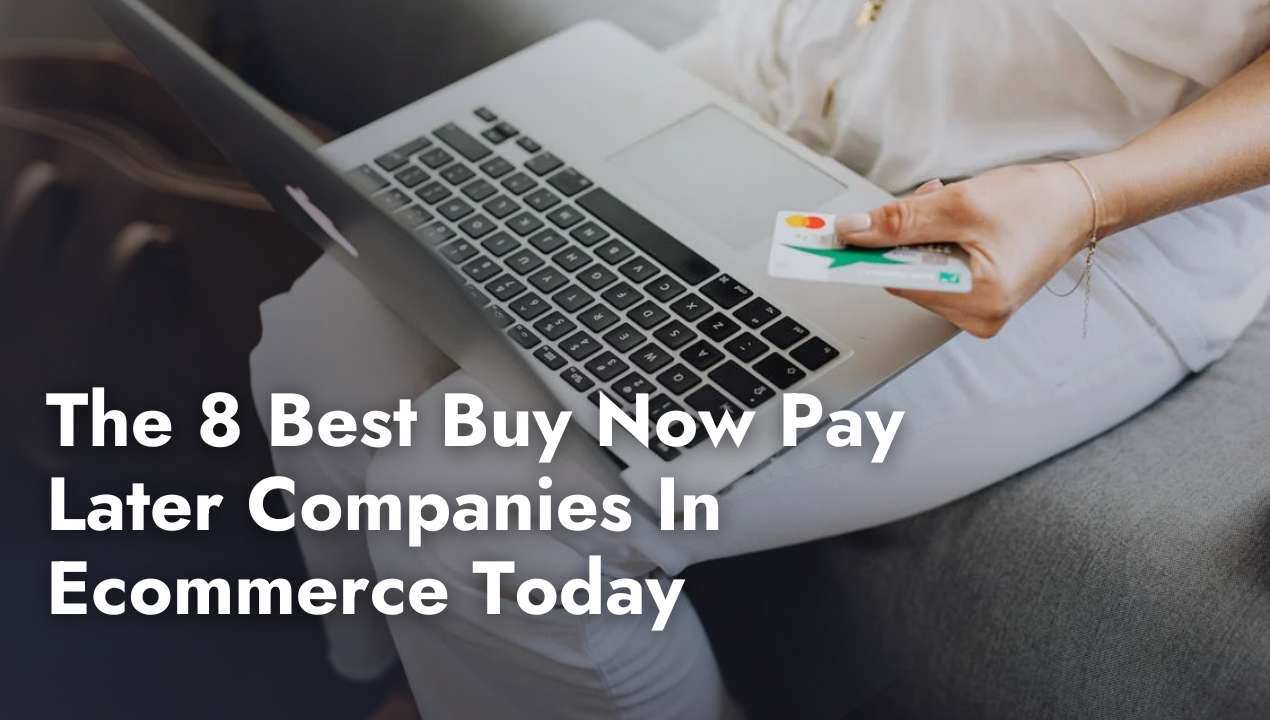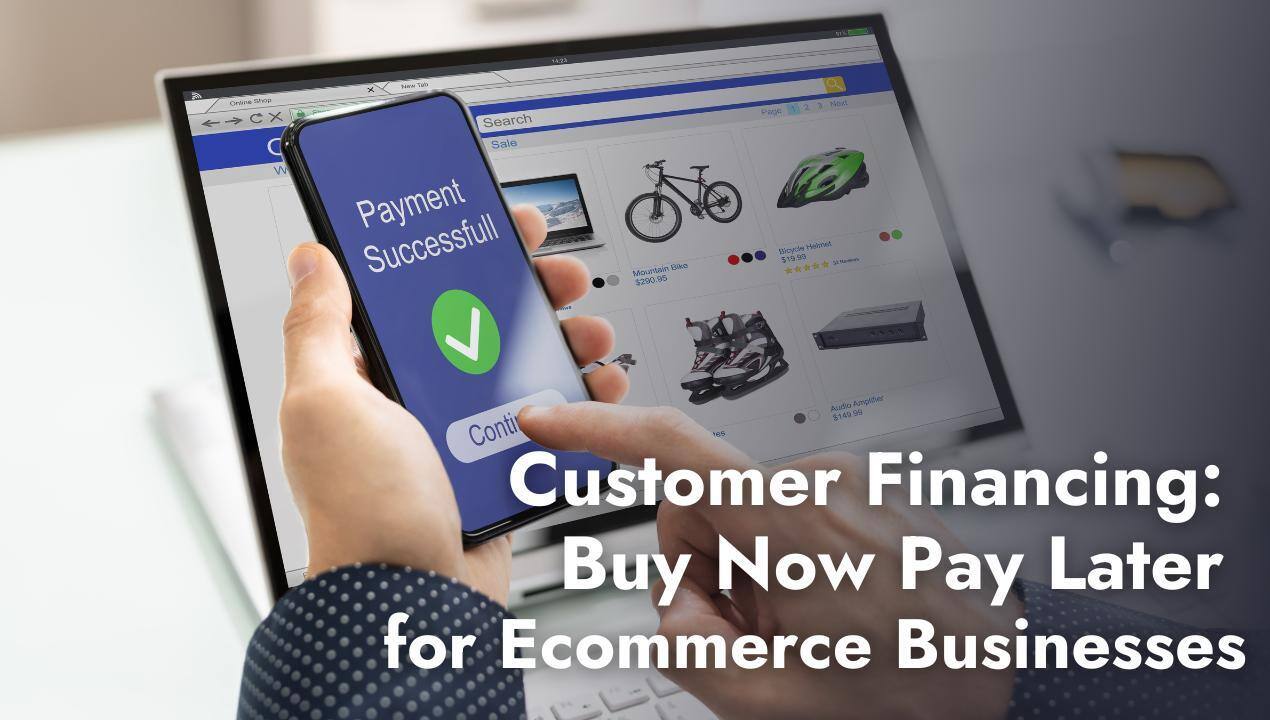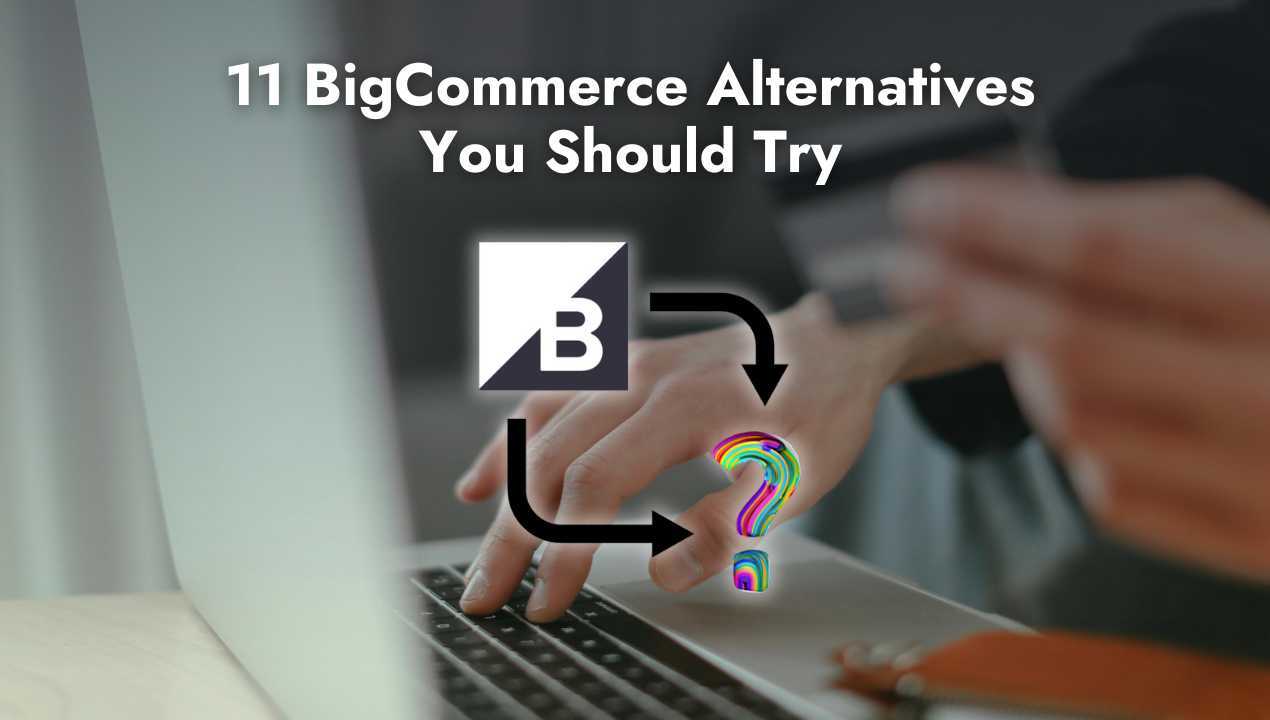Share this
The 8 Best Buy Now Pay Later Companies In Ecommerce Today
by Rin Mosher on Aug. 16, 2024

Integrating customer financing into your online checkout is a smart move considering the number of consumers that take advantage of Buy Now, Pay Later (BNPL) programs today. Yet, while meant to be plug-and-play for merchants, not all of these solutions are made for everyone. Your choice of BNPL companies has the potential to leave a positive – or negative – mark on buyers before and after purchase.
To help you ensure the best outcome possible, we’ve compiled this list of the best buy now pay later companies in ecommerce today. Analyze each option carefully and you’ll quickly get a good idea of which BNPL platforms are the right fit.
What Is Buy Now Pay Later (BNPL)?
Buy Now, Pay Later (BNPL) refers to an alternative payment method that allows customers to finance retail purchases. It works like a traditional bank loan, where the borrowed amount is paid off in installments over time.
The main difference is that BNPL programs are designed to cater to everyday shoppers’ immediate buying needs. Application approval typically only takes a few minutes and many plans come with little to no interest.
While some large stores operate in-house customer financing programs, most ecommerce businesses offer BNPL through third-party lending partners. Checkout integrations give buyers the ability to partially or entirely defer payment using these external providers alongside the traditional options for full payment via debit card or credit card.
How Buy Now Pay Later Companies Operate
Buy Now Pay Later companies are separate entities from the businesses they work with. An official third-party, these providers offer the service of quick, accessible financing plans free of the barriers of regular loans. Online stores act as a liaison between the two by integrating BNPL lug-ins into their checkouts. There's no additional work or risk on the merchant's end because the external lender pays the order total on customers' behalf upfront. BNPL companies handle everything from loan application to repayment themselves, so sellers have no post-sale responsibilities besides fulfilling the order accurately and on time.
Revenue models vary from service provider to service provider, but most arrangements involve a combination of merchant fees and consumer interest charges. Merchants typically pay a percentage of each transaction processed through the BNPL service, while consumers may incur interest or late fees if they miss payments. Some BNPL providers also generate income through partnerships with retailers or by offering additional financial products to their user base.
The popularity of BNPL services has grown significantly in recent years, particularly among younger consumers who may be wary of traditional credit cards or have limited credit history. This trend has led to increased competition in the space, with both established financial institutions and fintech startups vying for market share.
The Best Buy Now Pay Later Companies for Ecommerce Businesses
Offering BNPL to customers through your online store starts with picking a third-party service provider. We’ve compiled a list of 10 of the best BNPL companies with a breakdown of their specific loan options, terms, and fees below.
1. Affirm
Affirm is a long-standing financial services company that was founded in 2012. The San Francisco based firm has grown steadily over the years and now possesses a 80.75% share of the business-lending market – a point it was able to reach after acquiring competitor PayBright in 2021. Merchants work with Affirm for this massive footprint and the positive outcomes it promises.
Online stores offering Affirm BNPL reportedly experience 60%-plus increases in Average Order Values (AOVs) and repeat purchase rates of over 20%. Among the most well-known include Expedia, Priceline, and Best Buy.
Loan Terms
Pay In 4: Pay In 4 structures loan repayments in the traditional format most BNPL shoppers are used to, where four installments are charged every two weeks.
Monthly Payments: Monthly Payment plans allow customers to pay off large purchases over terms as long as four years.
Interest and Fees
Affirm doesn’t charge customers fees for late or rescheduled payments but is known to report delinquency to credit bureaus. It may also deny someone future loans if they have a history of missed payments.
The fee merchants pay to Affirm depends on the size of the business, its risk profile, and the specific BNPL program at hand. Expect charges to range between 2% and 6% plus a transaction fee of about $0.30 per purchase.
Pay In 4: No interest or APR charged on the borrowed amount.
Monthly Payments: Interest rates vary between 0% and 36% of the order total.
Credit Line
Affirm offers loans of up to $17,500, although individual shoppers’ credit limits vary. The company recommends merchants set a minimum purchase price of $50 for its BNPL options.
2. Afterpay
Afterpay allows consumers to make larger purchases at online and brick-and-mortar retailers through two BNPL financing plans. Its solutions are currently used by over five million people across the United States and are deployed by large brands such as Old Navy, Nordstrom, and Gap.
Loan Terms
Pay In 4: Divides purchase total into four equal installments with payment due every two weeks.
Monthly Financing: Offers the option to spread out repayment of purchases greater than $400 on a monthly basis for six or 12 months. This plan is available to most consumers in the United States, with exceptions for residents of Hawaii, Nevada, New Mexico, and West Virginia.
Interest and Fees
Afterpay charges merchants 4% to 7% of the customer’s purchase total plus a $0.30 processing fee per transaction.
Pay In 4: Pay In 4 is interest-free as long as the customer makes their payments on time. One $8 late fee is charged for every missed installment up to a maximum of 25% of the purchase price or $68, whichever is less.
Monthly Financing: No origination fee or late fee, but comes with regular interest ranging between 6.99% and 35.99% of the total loan amount.
Credit Line
Afterpay determines loan amounts on a case-by-case basis. Users must provide information about their credit history to receive a pre-approved spending limit, which can be anywhere from $200 to $2,000.
3. Sezzle
Sezzle is a publicly-traded company offering convenient BNPL programs to ecommerce shoppers in the United States and Canada. SoftMoc, Old Navy, and Winners are just a few examples of the estimated 47,000 merchants that now offer these alternative payment options at checkout.
Loan Terms
Pay In 4: Sezzle’s most popular BNPL plan, Pay In 4, splits purchase totals into four equal payments over a series of six weeks.
Pay In 2: Pay In 2 is like Pay In 4 but with a shorter loan term. The purchase is split into two installments and spread over a two week period.
Pay Monthly: Buyers make payments on a monthly basis until their loan is paid in full over a timeframe of up to four years.
Pay In Full: Although technically not BNPL, Pay In Full is another payment option offered by Sezzle. Shoppers choose it when they want to build their account’s spending history and hopefully secure larger loans down the road.
Interest and Fees
Sezzle’s main BNPL plans are interest-free and its Pay Monthly program charges interest. All enrollees are subject to fees for rescheduled payment (up to $7.50), late payment (up to $15.00), payment of installations by credit or debit card (up to $2.50), and failed payment (up to $5.00).
The Sezzle Merchant Agreement establishes a standard seller fee of 6.1% of the purchase total plus $0.30 per transaction. It notes that this standard rate may vary by industry – merchants in markets with higher risk profiles are charged higher fees.
Pay In 4: No interest charged on down payment or future installments.
Pay In 2: No interest charged on down payment or future installments.
Pay Monthly: Pay monthly plan offers vary. Most charge interest at annual percentage rates between 5.99% and 34.99%.
Pay In Full: Purchase amount is paid upfront, so there is no outstanding balance to which interest can be applied.
Credit Line
Shoppers with higher credit scores are more likely to secure large loans from Sezzle. The maximum amount this BNPL lends is $15,000.
4. PayPal
PayPal is a pioneer in flexible payment solutions. It first began offering lines of credit in 2008 under a program then known as Bill Me Later. Now customers can finance purchases across the web through Pay In 4, Pay Monthly, or Easy Payments if they’re a PayPal Credit account holder.
Loan Terms
Pay In 4: Purchases are broken into four installments over a period of six weeks.
Pay Monthly: Monthly-paid financing plans with six-month 6,12, and 24-month terms.
PayPal Credit Easy Payments: Up to six months without interest on purchases over $99, then additional charges for every month thereafter.
Interest and Fees
PayPal imposes fees upon merchants with virtually all of its checkout solutions. Charges are made on a per-transaction basis, where PayPal gets a percentage of the order total and usually a fixed top-up as well. The current rate for BNPL checkout in the United States is 3.49% plus $0.49. Businesses located outside the U.S. must pay an additional 1.50%.
Pay In 4: Each Pay In 4 installment is interest-free and there are no fees for late payments.
Pay Monthly: Customers pay a fixed interest rate, which can be anywhere between 9.99% and 35.99% depending on an individual’s credit factors.
PayPal Credit Easy Payments: Variable Purchase APR is 29.24%. Customers are also imposed with a minimum monthly interest charge of $2.00 and late fees of up to $41.
Credit Line
Pay In 4: Pay In 4 Allows customers to split purchases between $30 and $1,500.
Pay Monthly: Meant to finance larger purchases between $199 and $10,000 in value.
PayPal Credit Easy Payments: PayPal guarantees a $250 line of credit at minimum. The maximum amount a customer can borrow is determined based on their credit history and risk profile.
5. Klarna
Klarna is a Sweden-based fintech company with a range of payment processing services for ecommerce businesses. More than 450,000 retailers around the world have deployed these solutions, with BNPL being the most popular. Klarna says over 147 Million shoppers have used its Pay in 4 program before.
Several high-profile clients – namely Adidas, Sephora, Sonos, and Timberland – are to thank for that. Klarna accounts are issued by WebBank, a member of the Federal Deposit Insurance Corporation (FDIC).
Loan Terms
Pay In 4: Four interest-free payments every two weeks over an eight month period.
Pay In 30 Days: Customers can defer payment for a period of up to 30 days.
Monthly Financing: Klarna’s monthly financing plans spread the cost of a purchase over a period as long as 36 months, with payment first due one month after the store processes the order and then monthly thereafter.
Interest and Fees
All of Klarna’s payment plans charge merchants a $0.30 transaction fee plus variable fees ranging between 3.29% and 5.99% of the order total.
Pay In 4 and Pay In 30 Days: No fees or interest for customers if they pay on time.
Monthly Financing: Comes with APR of 19.99% and a minimum monthly interest charge of $2.00.
Failed payments on all plans are tacked onto the next installment with an additional charge of up to $7.00.
Credit Line
Klarna considers each customer’s unique history to determine lines of credit. It generally doesn’t support BNPL orders over $1000.
6. Zip
Zip, formerly known as Quadpay, is simple compared to other BNPL providers in that it only has one financing plan. More than 97,500 businesses across five continents offer the Pay In 4 program for online and in-store purchases over $35. Some of this lender’s most well-known retail partners include Target, Walmart, Home Depot, and Sephora.
Loan Terms
Zip’s core Pay In 4 loan is paid in four equal installments over a period of six weeks, with the first payment due at checkout.
Interest and Fees
Ecommerce businesses have the power to decide whether any of a customer’s repayment term is interest-free, and if so, the duration of that period. Merchant fees increase the longer an interest-free allowance is. Transaction fees can vary but are never more than $0.30 per sale.
Zip doesn’t charge interest on BNPL loans, however it does apply a $1 installment fee to each of the customer’s four payments. Those who are late paying may face an additional charge of $7. If any balance remains after the interest-free period ends, Zip applies a standard variable interest rate of 25.9%.
Credit Line
Shoppers can leverage up to $2,500 in spending power with Zip, depending on their personal credit history and risk profile.
7. Four
Four is a lesser-known – but growing and therefore relevant – BNPL option for ecommerce stores based in the United States. The 1,000-plus companies currently using its Shopify and WooCommerce integrations reportedly convert 30% more shoppers at checkout. Where most of the BNPL companies included in this list require users to sign up or download an app before taking out a loan, Four aims to minimize opportunities for abandonment by starting with payment.
Loan Terms
As its name implies, Four allows shoppers to break purchases up into four equal installments. It doesn’t appear to offer any other ways of splitting payments or repayment intervals other than two weeks.
Interest and Fees
Every BNPL purchase made through Four is interest-free. Users don’t incur additional charges up front, although they will be expected to pay a $7 charge for each and any late payment. Additional $8 charges are issued for missed installments that haven’t been rectified within seven days.
The only exception to this policy applies to residents of Idaho, California, and Wyoming, who face a single fee of $10 for payments that are late by 10 days or more. Four’s Terms and Conditions further give it the right to impose a platform charge of up to $3 per installment when deemed necessary.
The standard payment processing fee for retailers is currently 5.9% of the transaction total, plus $0.30 per sale. Four doesn’t return this payment to the merchant if the customer decides to return their purchase.
Credit Line
Four doesn’t publicly disclose the maximum amount of money it’s willing to lend. Merchants should reserve its BNPL solutions for smaller purchase totals.
8. Splitit
Splitit uses a unique BNPL framework in which buyers use a temporary authorization on their existing credit card to pay for a purchase upfront, and then repay the purchase total in monthly installments after the hold is lifted. This lender is popular among ecommerce businesses that sell expensive items, claiming an average order value of over $1,000.
Loan Terms
Ecommerce stores have discretion over the cards they accept through Splitit and the length of loan terms available. Customers choose from those preselected installment options – which can range between three and 24 months – at checkout. Merchants can also defer payment until after delivery, which is a great way to boost conversions for high-trust purchases.
Interest and Fees
Splitit doesn’t impose any interest or fees on buyers. It instead generates revenue from merchants with a percentage-based commission and fixed charge for every transaction made. Both are determined based on the loan term and total.
Credit Line
Buying power with Splitit is limited to the available balance on the customer’s existing credit card. Retailers have the ability to set a limit for the purchase amount they’re willing to let buyers pay. The default maximum is $10,000.
What to Consider When Choosing a BNPL Company
It’s evident from the list above that there’s no shortage of BNPL companies to work with today. You might feel inclined to choose more than one so as to give customers as many options as possible. However, it’s important to recognize how the viability of each lender may differ depending on terms, conditions, fees, and buyers’ needs. Some service providers may do more harm than good if the following factors don’t align.
Average Order Value (AOV)
BNPL services have a remarkable ability to boost Average Order Value (AOV) by empowering customers to make large purchases that they might not otherwise want to pay for in full. That psychological shift can be a game-changer for online stores that primarily sell high-priced items.
Such businesses should use high lending maximums as guidance in their comparison of BNPL companies. Ones that allow buyers to borrow more will better meet the needs of shoppers looking to finance big-ticket items. On the flip side, businesses with lower AOVs may want to prioritize BNPL providers that offer more flexible terms for smaller purchases.
Checkout Integration
It's no secret that a seamless checkout process can significantly impact conversion rates. In order to have a similarly positive effect, the BNPL solution you choose to integrate into your checkout page must add to rather than deteriorate the user experience. Loading speed and simplicity are two of the most influential factors at play.
Generally speaking, plug-in solutions that require minimal coding perform better than those demanding extensive set-up. Most of the BNPL companies on our list have easy-to-implement APIs or pre-built modules for popular ecommerce platforms; an integration for Shopify, WooCommerce, and Magento is essentially standard across the board.
Profit Margins
Most, if not all BNPL companies charge merchant fees. Amounts vary widely, from 1.5% to 8% of each transaction. Online stores with slim margins are at greater risk of losing money on BNPL transactions. Don't offer this alternative payment option just for the sake of offering an alternative payment option – know your break-even point and be realistic about the cut you can afford to give.
While BNPL has the potential to increase sales volume, that assumption can't be the sole basis for implementing it. You should at the very least break even if order volumes remain the same. Also be sure to evaluate any potential hidden costs, such as chargeback fees or integration expenses, because both can add up quickly and eat into your profits if not carefully managed.
Customer Support
While BNPL companies are responsible for managing loans with customers post-sale, your business will still be associated with any positive or negative interactions between the two. That's why it's important to thoroughly evaluate the quality of customer support offered by potential BNPL providers.
Responsive support teams, multiple contact channels, and clear dispute resolution processes all make a big difference in buyers' experience. Reviews and industry ratings can provide first-hand insights into what individual companies do and don't do well.
Pair the Best Buy Now Pay Later Companies with the Best 3PL In North America
Now that you have a holistic picture of the best buy now pay later companies out there today, you’re one step closer to closing in on this quickly-popularizing checkout strategy.
Just remember that the processes that begin after customers hit ‘Buy’ are just as critical to a positive experience. Shipfusion can be your partner in this respect, taking on every facet of logistics at a level of sophistication rivaling the best third-party logistics (3PL) companies in the industry. High standards enable us to consistently attain 99.9% order accuracy and 99.9% on-time delivery at scale.
Your online store has a bright future ahead – why limit it by choosing a fulfillment provider that can’t keep up? From dedicated Account Managers to proprietary software, Shipfusion is the best 3PL for ecommerce businesses that want to grow with confidence. Contact us today to learn more.
Share this
You May Also Like
These Related Articles

Customer Financing: Offer Buy Now Pay Later as an Ecommerce Business

Best Ecommerce Platforms for Small Businesses

11 BigCommerce Alternatives You Should Try
- July 2025 (2)
- June 2025 (22)
- May 2025 (27)
- April 2025 (27)
- March 2025 (26)
- February 2025 (26)
- January 2025 (35)
- December 2024 (16)
- November 2024 (22)
- October 2024 (22)
- September 2024 (27)
- August 2024 (9)
- July 2024 (8)
- June 2024 (5)
- May 2024 (8)
- April 2024 (8)
- March 2024 (6)
- February 2024 (6)
- January 2024 (5)
- December 2023 (3)
- November 2023 (3)
- October 2023 (5)
- September 2023 (4)
- August 2023 (2)
- July 2023 (1)
- June 2023 (4)
- March 2023 (2)
- October 2022 (1)
- September 2022 (5)
- August 2022 (4)
- July 2022 (7)
- June 2022 (4)
- May 2022 (4)
- April 2022 (6)
- March 2022 (2)
- February 2022 (1)
- January 2022 (3)
- December 2021 (2)
- November 2021 (4)
- October 2021 (2)
- September 2021 (5)
- August 2021 (4)
- July 2021 (4)
- June 2021 (3)
- May 2021 (2)
- April 2021 (3)
- March 2021 (3)
- February 2021 (3)
- January 2021 (2)
- December 2020 (4)
- November 2020 (2)
- October 2020 (4)
- September 2020 (2)
- July 2020 (5)
- June 2020 (4)
- May 2020 (2)
- April 2020 (2)
- March 2020 (4)
- February 2020 (1)
- December 2019 (1)
- May 2018 (1)
- March 2018 (2)
- February 2018 (3)
- January 2018 (3)
- November 2017 (3)
- July 2017 (4)
- March 2017 (3)
- February 2017 (5)
- January 2017 (3)
- December 2016 (4)
- November 2016 (6)
- October 2016 (6)
- October 2015 (1)
- September 2015 (1)
- June 2015 (3)
- May 2015 (3)
- August 2014 (1)
- July 2014 (1)
- March 2014 (1)
- February 2014 (1)